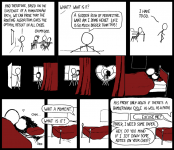I was thinking about Hilbert transforms earlier on (like you do...), and I did a google search. The first site I clicked on was an interesting tutorial. Looking at the URL I extracted the domain name and got the index page. It has a menu option 'Tutorials'.
Complex technology made real
The site is actually titled 'Complex communications technology made easy.'
The tutorials are basically signal processing, and that implies digital, these days, although analog subjects such as noise, the PDF and PSD are also covered.
Much of this is beyond the normal scope of audio, and the treatments are necessarily mathematical, but audio is an important part of signals, and much of signals is relevant to audio. If you're curious about, or even know something about things like Nyquist, the DFT, filters and coding, or even what a Hilbert transformer is good for, you may find something of interest or use there.
w
Complex technology made real
The site is actually titled 'Complex communications technology made easy.'
The tutorials are basically signal processing, and that implies digital, these days, although analog subjects such as noise, the PDF and PSD are also covered.
Much of this is beyond the normal scope of audio, and the treatments are necessarily mathematical, but audio is an important part of signals, and much of signals is relevant to audio. If you're curious about, or even know something about things like Nyquist, the DFT, filters and coding, or even what a Hilbert transformer is good for, you may find something of interest or use there.
w
Signal processing is a whole huge subject all of its own.
I once used a FFT Fast Fourier Transform to read vibrations from a car and tell you what speed the engine was running at. It was because someone wanted to know the engine speed without lifting the bonnet.
With the advent of very fast digital signal processors this has opened up lots of possibilities for audio processing digitally.
I once used a FFT Fast Fourier Transform to read vibrations from a car and tell you what speed the engine was running at. It was because someone wanted to know the engine speed without lifting the bonnet.
With the advent of very fast digital signal processors this has opened up lots of possibilities for audio processing digitally.
Excellent site. Bookmarked.
I plan on studying DSP after I really get SMPS type stuff under my belt.
I plan on studying DSP after I really get SMPS type stuff under my belt.
That site appears to have an RF/communications focus, and discusses a lot of RF modulation schemes that may be interesting but appear to have little to do with audio except that the modulated signal often happens to be audio.
Here's a very good, quite readable book online that covers general DSP and I find more applicable to audio:
The Scientist and Engineer's Guide to Digital Signal Processing
For a more in-depth treatment of all the mathematics and such, there's the "real" bible of DSP, "Discrete-Time Signal Processing," but I don't find that one necessary unless you're taking a college course that requires it. The print copy costs a lot more than DSPGuide, and it's not available from the author/publisher as a free download, either.
Here's a very good, quite readable book online that covers general DSP and I find more applicable to audio:
The Scientist and Engineer's Guide to Digital Signal Processing
For a more in-depth treatment of all the mathematics and such, there's the "real" bible of DSP, "Discrete-Time Signal Processing," but I don't find that one necessary unless you're taking a college course that requires it. The print copy costs a lot more than DSPGuide, and it's not available from the author/publisher as a free download, either.
Re Tutorials in Digital Communications
The three part “Fourier Analysis Made Easy” is excellent!
Even me, I managed to understand what is all about.
Something like “Fourier Analysis for dummies”.
Thanks Wakibaki
Regards
George
The three part “Fourier Analysis Made Easy” is excellent!
Even me, I managed to understand what is all about.
Something like “Fourier Analysis for dummies”.
Thanks Wakibaki
Regards

George
- Status
- Not open for further replies.
- Home
- General Interest
- Everything Else
- (Digital) Signal Processing
